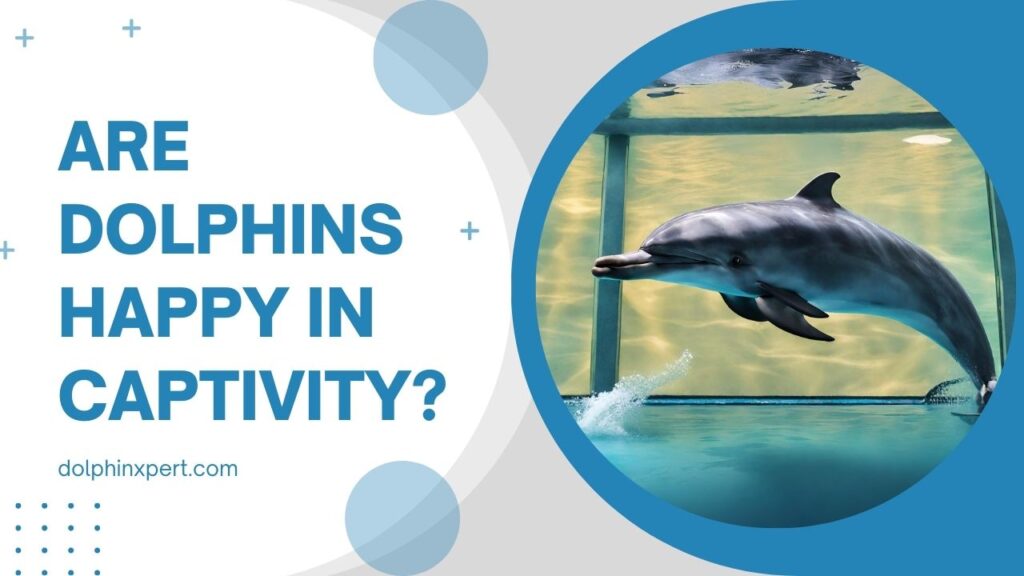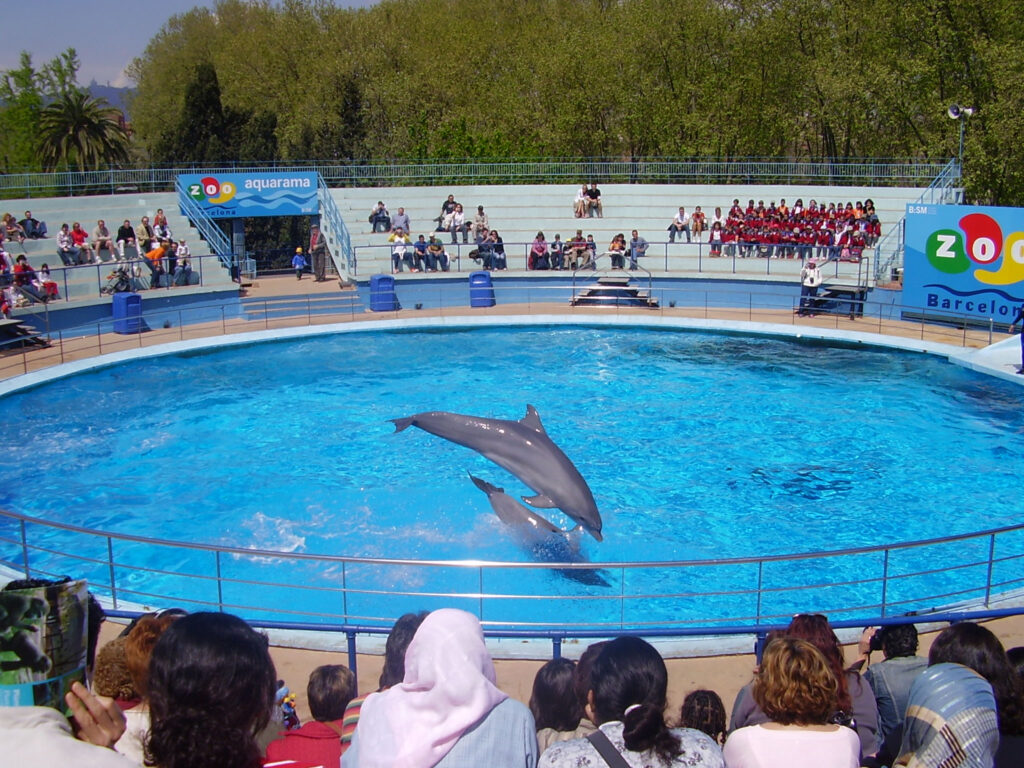Last updated on November 30th, 2023 at 11:35 am

Are Dolphins Happy In Captivity? Whether or not dolphins are happy in captivity is a complex question that has been debated by scientists and animal welfare advocates for many years.
Dolphins have captured the hearts of people all across the world with their playful demeanor and sharp intellect.
But when we think about dolphins kept in captivity, a crucial issue comes up: “Are dolphins happy in captivity?”
This essay will examine the benefits and drawbacks of retaining dolphins in captivity, as well as how they are handled there, and why some dolphins die tragically.
It will also discuss the arguments in favor of their confinement, and whether or not dolphins are content in zoos.
Table of Contents
- 1 Are Dolphins Happy In Captivity?
- 2 Dolphins In Captivity: Pros and Cons
- 3 How Are Dolphins Treated In Captivity?
- 4 Why Do Dolphins Die In Captivity?
- 5 Reasons Why Dolphins Should Be Kept In Captivity?
- 6 Are Dolphins Happy In Zoos?
- 7 Frequently Asked Questions (FAQs)
- 8 Conclusion: Are Dolphins Happy In Captivity?
Are Dolphins Happy In Captivity?
The complicated subject of whether dolphins in captivity are happy has been discussed for many years by scientists and proponents of animal welfare.
Since it is challenging to gauge a wild animal’s level of contentment in captivity, there is no simple solution.
Nonetheless, certain data indicates that dolphins might not be as content in captivity as they are in the wild.
For instance, stereotypical behaviors like swimming in circles or bobbing up and down at the water’s surface are frequently displayed by dolphins kept in captivity.
These actions are interpreted as indicators of boredom and tension.
Furthermore, the longevity of captive dolphins is comparatively shorter than that of wild dolphins. Additionally, they are more vulnerable to illness and harm.
This is probably because dolphins kept in captivity are kept in cramped enclosures and tanks, which might make it challenging for them to maintain their health and well-being.
However, certain facilities housing captive dolphins are made to offer the best conditions and care available to dolphins.
Dolphins are nevertheless kept in cramped spaces that are much removed from their native habitat, even in these institutions. [Are Dolphins Happy In Captivity?]
See Also: How Long Do Dolphins Live in Aquariums? Unveiling Captive Lifespan
Dolphins In Captivity: Pros and Cons
Pros
Education and Research: Dolphins in captivity provide an invaluable opportunity for researchers and educators to learn more about their behavior, intelligence, and physiology.
Conservation and Public understanding: These establishments can increase public understanding of the value of protecting marine habitats and the creatures who live there by showing dolphins.
Controlled Environment: Dolphins kept in captivity are shielded from pollution, wolves, and other dangers they may encounter in the wild.
Cons
Artificial Environment: Dolphins are extremely clever animals who do best in their native ocean environments, which are challenging to recreate in captivity.
Restricted Space: Dolphins are used to large ocean stretches, so keeping them in little tanks can cause mental and physical health problems.
Social Isolation: In captivity, dolphins are often separated from their social groups, causing loneliness and disrupting their natural social behaviors. [Are Dolphins Happy In Captivity?]

How Are Dolphins Treated In Captivity?
Dolphins kept in captivity continue to undergo a variety of treatments that may be detrimental to their well-being, even in the face of attempts to better their circumstances.
Feeding and Diet: Although trainers make an effort to feed dolphins a balanced diet, captive dolphins might not always have access to the large range of fish that they are used to in the wild.
Training and Performances: Positive reinforcement methods, such as praise and rewards, are used to train dolphins.
Their mental stimulation may be increased by this, but the pressure to do well may also be unpleasant.
Medical Care: Qualified veterinary specialists keep an eye on the well-being of captive dolphins and make sure they get the care they require.
Nonetheless, the strain of confinement may increase their susceptibility to illness. [Are Dolphins Happy In Captivity?]
Why Do Dolphins Die In Captivity?
Regrettably, the mortality rate of captive dolphins is higher than that of their wild counterparts. Their premature deaths are caused by multiple circumstances.
Stress and Anxiety: Prolonged confinement, little mental stimulation, and being cut off from their natural surroundings can lead to chronic stress, which impairs immunity and increases susceptibility to sickness.
Obstacles in Captive Breeding: There is a greater neonatal mortality rate when dolphins are bred in captivity due to numerous difficulties in the breeding process.
Premature Aging: Dolphins kept in captivity may age more quickly due to a lack of excitement and limited space, which shortens their longevity. [Are Dolphins Happy In Captivity?]
See Also: Are Dolphins Violent? Behind the Smiles
Reasons Why Dolphins Should Be Kept In Captivity?
A few arguments are made in favor of keeping dolphins in captivity, despite the fact that the topic is contentious.
Research and Conservation: By providing a controlled setting for scientific study and conservation initiatives, captivity enhances our knowledge of these amazing animals.
Education and knowledge: In order to promote the conservation of dolphins and their habitats, zoos and aquariums are essential in increasing public knowledge of marine environments.
Rehabilitation and Release: Dolphins who are rescued from the wild because they are sick or injured occasionally undergo rehabilitation in a cage setting before being allowed to return to the ocean.
Are Dolphins Happy In Zoos?
It is difficult to gauge the real degree of enjoyment that dolphins in zoos experience.
Despite efforts to enhance their lives and provide appropriate habitats, it’s crucial to keep in mind that dolphins have evolved to survive in the vastness of the ocean.
Even with well-meaning care, the confines of confinement can cause stress and keep them from finding the satisfaction that their wild counterparts would. [Are Dolphins Happy In Captivity?]
Frequently Asked Questions (FAQs)
Are Dolphins In Captivity Mistreated?
Even while abuse can happen, most institutions work hard to give dolphins the best care possible by abiding by rules and ethical standards.
Can Dolphins Survive In Captivity?
Indeed, given the right conditions and care, dolphins may survive in captivity. They might not be as safe as they would be in their natural environment, though.
Do Dolphins Enjoy Performing For Audiences?
Dolphins can display actions that could be taken as amusement since they are trained performers. The degree to which they find it gratifying is debatable, though.
Are All Dolphins In Captivity Unhappy?
No, not every dolphin kept in captivity is unhappy; rather, a dolphin’s welfare is contingent upon the particular circumstances and care provided by the institution.
Conclusion: Are Dolphins Happy In Captivity?
The subject of whether dolphins are content in captivity is still difficult to answer.
Dolphins kept in captivity may present opportunities for study and education, but there are serious worries about the effects on the animal’s physical and emotional health.
It is critical to strike a balance that puts the well-being of these amazing animals first while also honoring their natural habits in the wild as we investigate new methods to preserve and enjoy them.

Mr. Das, a certified pharmaceutical scientist, holds a Bachelor of Science in Pharmaceutical Sciences and passionately contributes to dolphin conservation as a member of the committee in Bangladesh.


